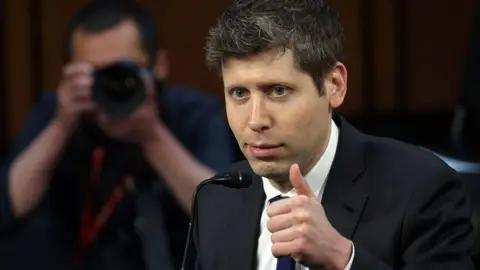In a notable turn of events in the technology sector, Sam Altman, the CEO of OpenAI, has revealed that employees within his organization have been targeted with “giant offers” by rival tech giant Meta. Reports suggest that Meta is offering compensation packages exceeding $100 million (£74.3 million) as signing bonuses to entice talent away from OpenAI. This strategic move comes as Meta seeks to strengthen its artificial intelligence capabilities, an area in which OpenAI has emerged as a leading player.
Meta, which oversees significant platforms such as Facebook, Instagram, and WhatsApp, has made considerable investments in artificial intelligence, including a recent acquisition where they invested $14 billion (£10.4 billion) for a 49% stake in Scale AI, a burgeoning startup in the AI field. Despite these aggressive poaching tactics, Altman was quick to note that “at least so far,” none of his top talent had been lured away by Meta’s lucrative offers. This sentiment highlights an underlying loyalty and dedication among OpenAI’s workforce, which Altman credits to the organization’s compelling mission.
During an appearance on a podcast hosted by his brother, Jack Altman, Sam articulated his respect for Meta’s competitive posture against OpenAI. He acknowledged that besides sizable signing bonuses, Meta is also presenting enhanced annual compensation options, although he refrained from disclosing details pertaining to structures like salary, stock options, or other incentives. Altman expressed optimism that the allure of OpenAI’s mission—particularly its vision of developing superintelligence—remains a driving factor for employees, suggesting that this shared aspiration might outweigh short-term financial offers.
Both OpenAI and its counterparts in the AI industry speculate that we are nearing the development of what is known as artificial general intelligence (AGI), wherein AI systems will exhibit capabilities equal to or surpassing human performance. The ambition to achieve superintelligence takes this goal even further, aiming to create AI systems capable of extraordinary cognitive abilities that exceed human potential. In this race, major tech companies are pouring enormous resources into AI endeavors, evidenced by OpenAI’s announcement of a collaborative initiative in January to spend a staggering $500 billion on new data centers, crucial for powering AI operations in the U.S.
Altman is confident in OpenAI’s prospects, proclaiming that the company’s culture stands out as a significant advantage. He emphasized that it fosters an innovative environment crucial for attracting talented engineers, distinguishing it from competitors like Meta, which he described as being less adept in terms of innovation. His comments also reflect a competitive analysis of Meta’s efforts to rapidly scale its AI capabilities. Characters like Altman, Zuckerberg, and Musk provide a continual narrative of rivalry and admiration, often articulated through platforms such as podcasts where opinions about each other’s businesses emerge candidly.
Beyond Altman’s remarks, tech leaders have been increasingly vocal about their thoughts on competition within the industry. For instance, Mark Zuckerberg has previously highlighted the importance of innovation in tech, remarking on Apple’s iPhone as a monumental invention while critiquing its recent struggles to deliver on innovative projects. Such exchanges, including the well-publicized feud between Zuckerberg and Musk, enhance the narrative of competition and aspiration that permeates the technology landscape.
In conclusion, while Meta’s attempts to poach talent from OpenAI through significant financial incentives signal intense competition in the AI sector, Altman’s assurance of employee loyalty to OpenAI’s mission illustrates that vision and purpose may retain equal weight against monetary motivation. As the technology landscape evolves, the interplay between innovation, investment, and talent retention will significantly shape the race toward groundbreaking advancements in artificial intelligence.



